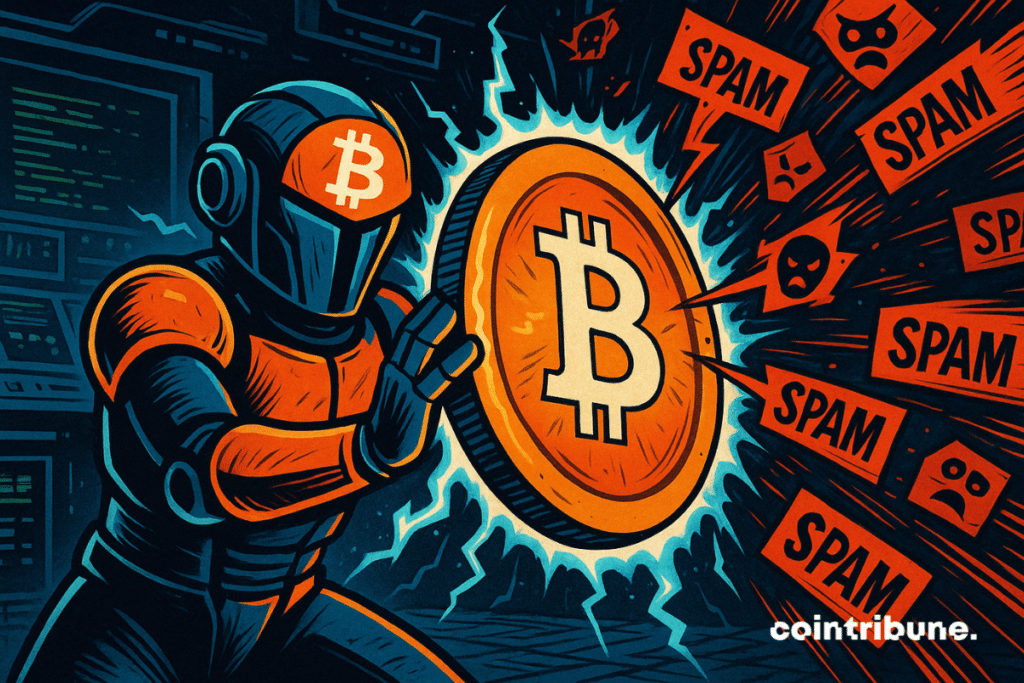20h05 ▪
4
min read ▪ by
The great Bitcoin network cleanup is back on the table. Some call it digital hygiene. Others see disguised censorship. And at the heart of this commotion, one name: GrassFedBitcoin. This developer is reigniting an old debate, accusing spammers of choking the protocol. And now the veterans are waking up. Saifedean Ammous, author of “The Bitcoin Standard,” says he is ready to financially support a technical crusade against what he considers a deviant use of Bitcoin. Jealous crowd or gatekeepers of the temple?


In brief
- GrassFedBitcoin revives the idea of filtering inscriptions via pull request #28408.
- Ammous financially supports an anti-spam developer to cleanse the Bitcoin protocol.
- Adam Back mentions an endless race between spammers and filters, implying potential inefficiency.
- The debate reveals a divide between strict monetary uses and absolute on-chain freedoms.
Filters for Bitcoin: A Disruptive Idea
GrassFedBitcoin wants to reopen pull request #28408. It would allow Bitcoin nodes to automatically filter the infamous “inscriptions.” These data, often images, saturate blocks without real monetary utility. For him, this is a deviation. He states:
No one wants to relay inscriptions. Give them tools for this purpose, make them configurable, and define a default policy that makes bitcoin as a whole more conducive to monetary activity – and not to storing JPGs.
He adds that previous increases in the OP_RETURN limit were based on false assumptions. He calls for a modular default policy favoring financial transactions and discouraging image storage. This position, although supported, is not unanimous.
Adam Back, CEO of Blockstream, tempers the enthusiasm. For him, it is an “arms race”. He explains that spam can always disguise itself as valid code: “The code is infinitely variable“, he says. Therefore, spammers can always bypass filters.
But for GrassFedBitcoin, the spam mechanism remains predictable. “If you give me filters, I will use them“, he asserts. His argument: with sufficient adoption, spam decreases due to technical constraints.
Bitcoin or Bitstore? The Protocol’s Identity at Stake
The question goes beyond technicalities. It touches the very soul of Bitcoin. Is it a store of value or a JPEG file repository? For Ammous, it’s clear: action is required. “It’s not easy, but it’s worth trying to ruin spammers faster“, he writes. He insists: filtering is not censorship.
Nodes already reject invalid transactions. So filtering is a usage right, not an attack on freedom.
But opposition remains strong. Some talk of authoritarian drift, others defend their freedom to code. More technical voices point out that current spams exploit the signature witness (witness discount), which is supposed to reduce the UTXO base but actually increases it in practice.
Here is a summary of the sticking points:
- The average block could reach 4 MB with inscriptions (source: Mempool Research);
- The current block is around 1.5 MB;
- The signature witness is diverted from its original function;
- Filters can reduce spam in a non-linear way;
- Forks like Knots already offer these options, but few are adopted.
Behind these figures, a war of visions. Some want a clean Bitcoin, focused on money. Others, a space for expression without constraints. Two utopias clash.
Recently, OP_RETURN has already generated a lot of ink. As proposals harden, it seems the entire Bitcoin structure is ready to shift. More than a debate on spam, this might be a profound identity turning point for the protocol.
Maximize your Cointribune experience with our “Read to Earn” program! For every article you read, earn points and access exclusive rewards. Sign up now and start earning benefits.
La révolution blockchain et crypto est en marche ! Et le jour où les impacts se feront ressentir sur l’économie la plus vulnérable de ce Monde, contre toute espérance, je dirai que j’y étais pour quelque chose
DISCLAIMER
The views, thoughts, and opinions expressed in this article belong solely to the author, and should not be taken as investment advice. Do your own research before taking any investment decisions.




